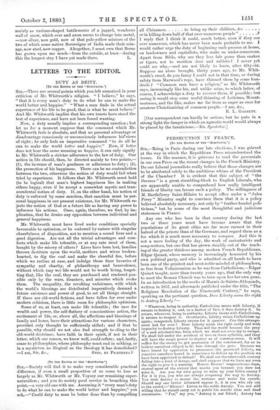[TO THE EDITOR OF THE ..spiscreres..-]
Sia,—Society will find it to make very considerable practical difference, if even a small proportion of us come to lose as largely as Mr. Whitworth or Mr. Voysey our remaining super- naturalism ; and you do society good service in broaching this point,—a very old one with me. Assuming it "every man's duty to do what he can to make the world better and happier," you ask,—" Could duty to man be better done than by compelling all Chinamen to bring up their children, Li:c
or in killing down half of that over-numerous people" I reply that I think it could, much better, even if they are over numerous, which has never been made probable to me. I would rather urge the duty of beginning such process at home, on landowners and capitalists, who make us under-numerous. Apart from Bible, why are they less fair game than snakes or tigers, not to mention deer and rabbits ? I never yet could see why,—and am not likely to learn, after fifty-six. Suppose me alone brought, thirty years ago, to Mr. Whit- worth's creed, do you fancy I could not in that time, or during safety from Marwood's rope, have thinned them by some hun- dreds? "Common men have a religion," as Mr. Whitworth says, increasingly like his, and unlike mine, to which latter, of course, I acknowledge a duty to recover them, if possible; but seeing it would stop some useful thinning of Leitrims, Mount- morreses, and the like, makes me far from as eager as once for amateur Christianising of common people.—I am, ezc.,
E. L. GA.anErr.
[Our correspondent can hardly be serious, but he puts in a strong light the danger in which an agnostic world would always be placed by the fanaticisms.—En. Spectator.]


































 Previous page
Previous page